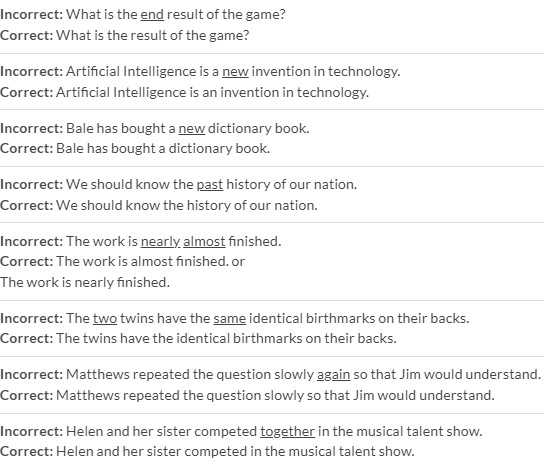What reduces your IELTS score by 10 – 17% and you can’t even help it! Quick-fix solution for REDUNDANCY •IIWI
Overcoming this 1 bad grammar habit improves your IELTS score STRAIGHT by one band.
Even as I write this blog post, I revise for extra words after every four sentences. Usually, I end up deleting two to three words per 30 words to keep sentences crisp.
The more one can say in least possible words, the better it is.
You as an IELTS-test-taker need to keep your speaking and writing crisp for high-scores.
Saying things in least words is not that easy because:
One, it is a natural human tendency to repeat things (we do it even when we communicate in our mother tongue, perhaps to a lesser extent).
Two, beginner language learners tend to use multiple linguistic components to say the same thing because of lack of both: confidence and experience of language making.
What it takes to leave this habit: Sensitization + A Thorough Understanding of Issue + Guided Grammar Training for Issue Resolution
Most commonly, when students join a Grammar and Writing Improvement Course at IIWI, they have a high degree of redundancy in speaking and writing, an average of 2-5 unnecessary words for every 12 words. By the end of the course though, students learn to reduce extra words by more than 50%.
If you have enough time, You can attend our IIWI IELTS Grammar Course and learn how to make your writing & speaking crisp and impressive.
Now, let’s start with understanding the concept of redundancy. Here goes!
#1. Topic explained – What is redundancy?
According to the Cambridge dictionary, redundancy is defined as:
“the unnecessary use of more than one word or phrase meaning the same thing”.
In simple words: Redundancy occurs when you use unnecessary (extra/not required) words when you speak or write. You use two or more words where only one word is enough to tell the complete meaning.
10 Common Examples of Redundancy
1. Evil villains When were villains not evil ever? 😆
2. Unexpected surprise Have the surprises started announcing their coming or what!
3. As for example
4. Advance forward Uh-oh! You advance backward too. Is it? 😀
5. Revert back No, I’m going to revert ahead! 😃
6. Add an additional Why would an additional be subtracted, ever/ 🙄
7. Close togetherness How about ‘Apart togetherness’!! 😉
8. Completely fulfilled Half fulfilled is my option! 😀
9. Atlas book Atlas is not a notebook, I know.
10. Repeat again please I’m going to repeat it but not again! 😄
Jokes apart! Aren’t all villains evil? Aren’t all surprises unexpected? Isn’t an advance always forward? Isn’t an additional always added?
So, can you see how annoying it is!
When we speak or write spontaneously, we all have some amount of redundancy in our words and we don’t realize it. It’s natural, yes. But then, listeners and readers will like the speaker or writer to say more in less words. As such the attention spans are decreasing nowadays (15 secs or less)!
Can you recall a conversation where someone spoke on a topic you liked but you got impatient hearing that person? Why can’t he cut the long short? Why doesn’t he just come to the point? Why did he have to tell all those details?
If these were the questions coming to your mind, the person’s spoken content surely had a high redundancy factor.
More Examples: Here! Read some interesting examples in this India Today article.
https://www.indiatoday.in/education-today/grammar-vocabulary/story/redundant-words-1-344690-2016-10-03

#2. Homonyms: Another meaning of Redundancy
Homonyms – two meanings of same word. same word, same spellings but two(or more) different meanings.
If you didn’t know, Redundancy also means getting outdated at employable skills. You must know this second meaning of the word.
If you’re interested to know more, you can read this article by a top-line world renowned newspaper. I’m sure you’ll find it interesting. It will improve your vocabulary, general knowledge and exposure to world trends.
https://www.forbes.com/sites/biancamillercole/2020/09/28/how-to-bounce-back-from-redundancy-10-top-tips/?sh=160844ca1b36
When you want to learn English to improve communication you must read whenever you get a chance. Take it from me, each time you do this you improve your confidence for IELTS exam.
So, Happy reading!
#3. Why should we avoid redundancy | Why is redundancy bad

Well, Redundancy is exactly what George Orwell is talking about!
Redundant words and phrases in a sentence make poor the beauty of the sentence. Rather than improving the meaning of the sentence, the redundant words or phrases interfere with the readability.
The listener or reader gets confused.
The irrelevant extra words deviate the sentence from what it actually wants to say. The correct meaning is unclear or distorted.
No one likes heavy unclear language.
So, avoid redundancy like plague if you want an IELTS high-score band 6-8.

#4. How it affects your score in 7 ways.
#4 How redundancy affects your IELTS score
7 Reasons why Redundancy gets you a low-score
#1 It affects the clarity of meaning (makes your language vague and repetitive).
#2 It lowers your economy of words*
#3 It is a sign of weak grammar control
#4 It lowers readability.
#5 You can’t have a well-developed response with redundancy (Task response low score) .
#6 It shows you have a lower Lexical Resource (limited vocabulary etc)
#7 It leads to weak Compositional skills (paragraphing, overall impact etc)
#5. How to reduce redundancy in writing.
#5 How to reduce redundancy in writing
7-ways-to-reduce-redundancy (for beginners)
Step1: Dedicate one revision of your written draft to ONLY reducing redundancy.
Step2: Revisit your sentences.
Step3: Look for repeated words.
Step4: Look for words that, if deleted, leave the sentence’s meaning unchanged.
Step5: Use more synonyms or antonyms with a negative
Step6: Use more of compound and complex sentences.
Step7: Rewrite the whole draft.
So, writing and rewriting gives you better language control. But ONLY WHEN considerable mistake removal is a part of the process. You should get into a habit of doing multiple drafts and look for expert guidance for at least the first 5 essay writing tasks.
Expert guidance is especially advised for learning how to reduce redundancy because of one important reason. Actually, unless you’ve been into editing, it is difficult for you to spot redundant language/information in your own writing. What happens is, the more we read and re-read our text, the lesser the ability of our eye to spot the mistakes. So, you need an expert to sensitize you to your own writing’s repetitiveness. You need to train for self-editing under guidance.
Next step, let’s try to identify and omit redundancy.
Take a look at these sentences-
1) The resulting shade was purple in color.
2) Various modifications of the program have recently been developed.
3) I added a dash of sugar to each individual cup of curd.
At first glance, the sentences look alright. You are able to understand the meaning. Now, compare with the following options –
1) The shade was purple.
2) The program has been recently modified.
3) Sugar was added to each cup of pudding.
The second set of sentences are shorter and have more impact.
Students aiming at Band 6 and higher should practice removing redundancy in greater detail.
That’s why I recommend you join IIWI Writing Course. I will personally be there!
We help you improve at more than 10 aspects of reducing redundancy alone.
It’s a highly effective course. Guaranteed improvement!
You can contact us for one-to-one sessions or attend our IIWI IELTS Writing Course. IIWI guidance will make your language improvement journey less frustrating, more focused and give you great results in less time.
We have more than 95% success at helping students get IELTS higher-scores.
Some more examples of redundant sentences

#6. Useful Links
Here’s an A to Z list of redundant expressions –
https://www.govinfo.gov/content/pkg/USCOURTS-ca4-17-06375/pdf/USCOURTS-ca4-17-06375-1.pdf

Founder- IIWI Learning IELTS 8+ Coach, 30 yrs exp.|Author|Blogger


Leave a Reply